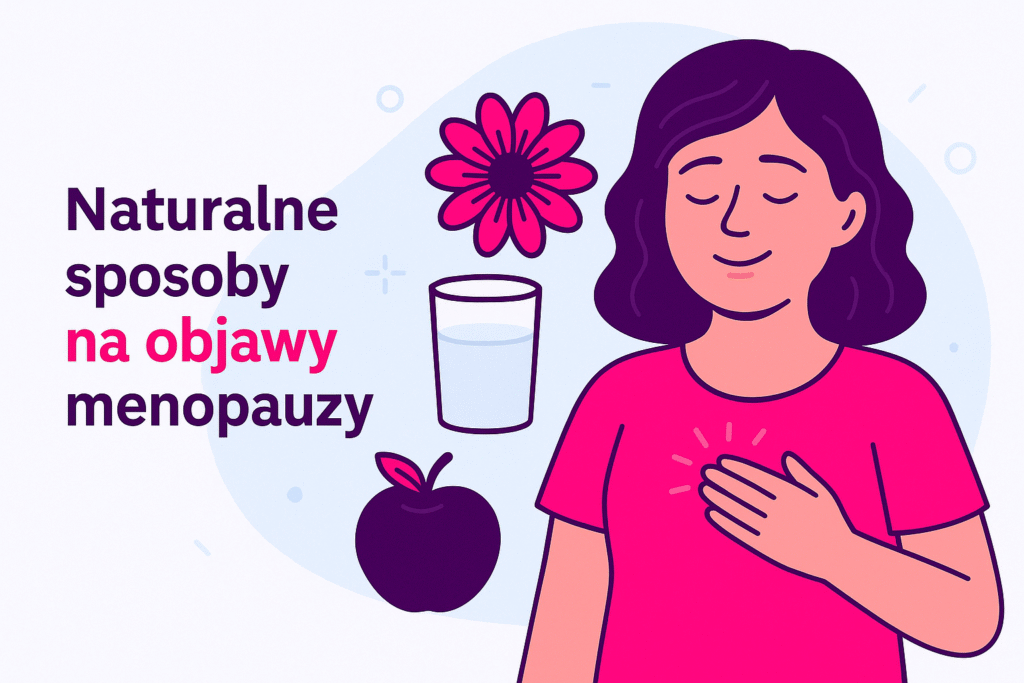Menopause is a time of dynamic hormonal changes that can cause a variety of unpleasant symptoms—from hot flashes and sleep problems to reduced libido and mood swings. Although hormone replacement therapy is one of the most effective treatments, many women seek natural ways to alleviate menopausal symptoms—for health, philosophical reasons, or fear of side effects. The good news is that certain lifestyle changes, diet, and herbs can provide real relief, supported by scientific research.
1. Diet Rich in Phytoestrogens
Phytoestrogens are natural plant compounds with a structure similar to estrogen. They are found in soy, flaxseed, sesame, and red clover. They can gently bind to estrogen receptors and mimic (or block) estrogen activity in the body¹.
Research suggests that women who consume large amounts of soy isoflavones experience fewer hot flashes and have a better lipid profile². In Asia, where the diet is rich in soy, menopausal symptoms are less common and less severe³.
Recommended foods:
- Tofu, tempeh, soy milk
- Flaxseed (ground)
- Legumes
2. Herbs Supporting Hormonal Balance
Some herbs have shown effectiveness in easing menopausal symptoms, though the results may vary individually depending on the dose and duration of use:
- Black cohosh (Cimicifuga racemosa): reduces hot flashes, sleep disturbances, and mood swings⁴
- Red clover (Trifolium pratense): source of isoflavones, may act similarly to estrogen⁵
- Chasteberry (Vitex agnus-castus): may support hormonal regulation, especially during perimenopause⁶
- St. John’s Wort: relieves mild depression and anxiety (caution: possible drug interactions)
Herbs should be used with caution, preferably after consulting a herbalist or physician, especially if the woman is taking other medications.
3. Physical Activity
Regular exercise is one of the simplest and most effective ways to reduce menopausal symptoms. Exercise:
- Reduces the frequency and intensity of hot flashes⁷
- Improves sleep quality and mood (antidepressant effect)
- Strengthens bones and prevents osteoporosis
- Helps control weight and reduce body fat
Recommended forms of activity:
- Brisk walking, Nordic walking
- Swimming, cycling
- Yoga and Pilates (improves flexibility, reduces stress)
- Strength training 2–3 times a week (prevents muscle loss)
4. Healthy Sleep and Circadian Hygiene
Insomnia is one of the most common issues during menopause. Natural strategies that support sleep include:
- Regular sleep and wake times
- Avoiding caffeine and alcohol in the evening
- Ventilating the bedroom and blocking light sources
- Melatonin supplementation – helpful for sleep disturbances⁸
- Meditation, breathing techniques, yoga nidra
5. Stress Reduction and Emotional Support
Hormonal fluctuations increase susceptibility to stress, anxiety, and depression. It’s worth incorporating techniques that lower cortisol levels and improve mood:
- Mindfulness meditation (e.g., Calm, Insight Timer apps)
- Regular yoga practice
- Cognitive behavioral therapy (CBT) – also effective for hot flashes⁹
- Spending time in nature (forest bathing, gardening)
- Talking to a therapist or joining a support group
6. Natural Supplements and Micronutrients
Some vitamins and minerals support hormonal health and help relieve menopausal symptoms:
- Vitamin D and calcium: for bone health and osteoporosis prevention
- Magnesium: calming effect, improves sleep quality
- Omega-3 fatty acids: support the nervous system, reduce inflammation
- Vitamin B6 and B12: support mood and cognitive function
Choose high-quality supplements, ideally with a purity certification. These can be selected in consultation with a doctor or nutritionist.
Natural methods for alleviating menopausal symptoms can be effective, especially when part of a holistic lifestyle. The key is consistency, patience, and good observation of your body. Many women who choose this approach experience significant improvements in quality of life—without resorting to strong medications.
However, before starting self-treatment with herbs or supplements, it’s advisable to consult a physician—especially if you take chronic medications, have heart conditions, hormonal disorders, or have undergone cancer treatment.
References
- Patisaul HB, Jefferson W. The pros and cons of phytoestrogens. Front Neuroendocrinol. 2010.
- Lethaby A et al. Phytoestrogens for vasomotor menopausal symptoms. Cochrane Database Syst Rev. 2013.
- Adlercreutz H. Phytoestrogens and Western diseases. Ann Med. 1998.
- Leach MJ, Moore V. Black cohosh (Cimicifuga spp.) for menopausal symptoms. Cochrane Database Syst Rev. 2012.
- Baber RJ et al. Isoflavones for menopausal symptoms. Climacteric. 2011.
- van Die MD et al. Vitex agnus-castus extracts for female reproductive disorders. Planta Med. 2013.
- Daley A et al. Exercise for vasomotor menopausal symptoms. Cochrane Database Syst Rev. 2014.
- Wade AG et al. Efficacy of melatonin for menopausal sleep disturbances. Climacteric. 2011.
- Hunter MS et al. Cognitive behavioural therapy for menopausal symptoms. BMJ. 2015.

